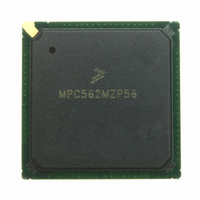MPC562MZP56 Freescale Semiconductor, MPC562MZP56 Datasheet - Page 701

MPC562MZP56
Manufacturer Part Number
MPC562MZP56
Description
IC MPU 32BIT 56MHZ PPC 388-PBGA
Manufacturer
Freescale Semiconductor
Series
MPC5xxr
Datasheet
1.MPC561MZP56.pdf
(1420 pages)
Specifications of MPC562MZP56
Core Processor
PowerPC
Core Size
32-Bit
Speed
56MHz
Connectivity
CAN, EBI/EMI, SCI, SPI, UART/USART
Peripherals
POR, PWM, WDT
Number Of I /o
64
Program Memory Type
ROMless
Ram Size
32K x 8
Voltage - Supply (vcc/vdd)
2.5 V ~ 2.7 V
Data Converters
A/D 32x10b
Oscillator Type
External
Operating Temperature
-40°C ~ 125°C
Package / Case
388-BGA
Processor Series
MPC5xx
Core
PowerPC
Data Bus Width
32 bit
Data Ram Size
8 KB
Interface Type
SCI, SPI, UART
Maximum Clock Frequency
40 MHz
Number Of Programmable I/os
56
Number Of Timers
22
Operating Supply Voltage
2.6 V to 5 V
Maximum Operating Temperature
+ 85 C
Mounting Style
SMD/SMT
Minimum Operating Temperature
- 40 C
On-chip Adc
2 (10 bit, 32 Channel)
For Use With
MPC564EVB - KIT EVAL FOR MPC561/562/563/564
Lead Free Status / RoHS Status
Request inventory verification / Request inventory verification
Eeprom Size
-
Program Memory Size
-
Lead Free Status / Rohs Status
No
Available stocks
Company
Part Number
Manufacturer
Quantity
Price
Company:
Part Number:
MPC562MZP56
Manufacturer:
FREESCAL
Quantity:
204
Company:
Part Number:
MPC562MZP56
Manufacturer:
Freescale Semiconductor
Quantity:
10 000
Part Number:
MPC562MZP56
Manufacturer:
FREESCALE
Quantity:
20 000
Company:
Part Number:
MPC562MZP56R2
Manufacturer:
RFT
Quantity:
1 441
Company:
Part Number:
MPC562MZP56R2
Manufacturer:
Freescale Semiconductor
Quantity:
10 000
- Current page: 701 of 1420
- Download datasheet (11Mb)
16.3.1.5
Each message buffer must be activated once it is configured for the desired operation. A buffer is activated
by writing the appropriate code to the control/status word for that buffer. Once the buffer is activated, it
will start the normal transmit and receive processes.
A buffer is deactivated by writing the appropriate deactivation code to the control/status word for that
buffer. A buffer is typically deactivated to reconfigure the buffer (for example to change the buffer’s
function from Rx to Tx or Tx to Rx). The buffer should also be deactivated before changing a receive
buffer’s message identifier or before loading a new message to be transmitted into a transmit buffer.
For more details on activation and deactivation of message buffers and the effects on message buffer
operation, refer to
16.3.1.6
In addition to the activation/deactivation mechanism, the TouCAN also uses a lock/release/busy
mechanism to ensure data coherency during the receive process. The mechanism includes a lock status for
each message buffer and uses the two serial message buffers to facilitate frame transfers within the
TouCAN.
Reading the control/status word of a receive message buffer triggers the lock for that buffer. While locked,
a received message cannot be transferred into that buffer from one of the serial message buffers.
If a message transfer between the message buffer and a serial message buffer is in progress when the
control/status word is read, the BUSY status is indicated in the code field, and the lock is not activated.
The user can release the lock on a message buffer in one of two ways. Reading the control/status word of
another message buffer locks that buffer, releasing the previously locked buffer. A global release can also
be performed on any locked message buffer by reading the free-running timer.
Once a lock is released, any message transfers between a serial message buffer and a message buffer that
were delayed due to that buffer being locked will take place. For more details on the message buffer
locking mechanism, and the effects on message buffer operation, refer to
Operation.”
16.3.2
The receive mask registers are used as acceptance masks for received frame IDs. The following masks are
defined:
The value of the mask registers should not be changed during normal operation. If the mask register data
is changed after the masked identifier of a received message is matched to a locked message buffer, that
message will be transferred into that message buffer once it is unlocked, regardless of whether that
message’s masked identifier still matches the receive buffer identifier.
Freescale Semiconductor
•
•
A global mask, used for receive buffers 0-13
Two separate masks for buffers 14 and 15
Receive Mask Registers
Message Buffer Activation/Deactivation Mechanism
Message Buffer Lock/Release/Busy Mechanism
Section 16.4, “TouCAN
MPC561/MPC563 Reference Manual, Rev. 1.2
Operation.”
Table 16-6
Section 16.4, “TouCAN
shows mask bit values.
CAN 2.0B Controller Module
16-7
Related parts for MPC562MZP56
Image
Part Number
Description
Manufacturer
Datasheet
Request
R
Part Number:
Description:
Mpc562 32 Bit Powerpc Microcontroller
Manufacturer:
Freescale Semiconductor, Inc
Datasheet:

Part Number:
Description:
MPC5 1K0 5%
Manufacturer:
TE Connectivity
Datasheet:

Part Number:
Description:
MPC5 500R 5%
Manufacturer:
TE Connectivity
Datasheet:

Part Number:
Description:
MPC5 5K0 5%
Manufacturer:
Tyco Electronics
Datasheet:

Part Number:
Description:
MPC5 5R0 5%
Manufacturer:
Tyco Electronics
Datasheet:

Part Number:
Description:
MPC5 50K 5%
Manufacturer:
Tyco Electronics
Datasheet:
Part Number:
Description:
Manufacturer:
Freescale Semiconductor, Inc
Datasheet:
Part Number:
Description:
Manufacturer:
Freescale Semiconductor, Inc
Datasheet:
Part Number:
Description:
Manufacturer:
Freescale Semiconductor, Inc
Datasheet:
Part Number:
Description:
Manufacturer:
Freescale Semiconductor, Inc
Datasheet:
Part Number:
Description:
Manufacturer:
Freescale Semiconductor, Inc
Datasheet:












